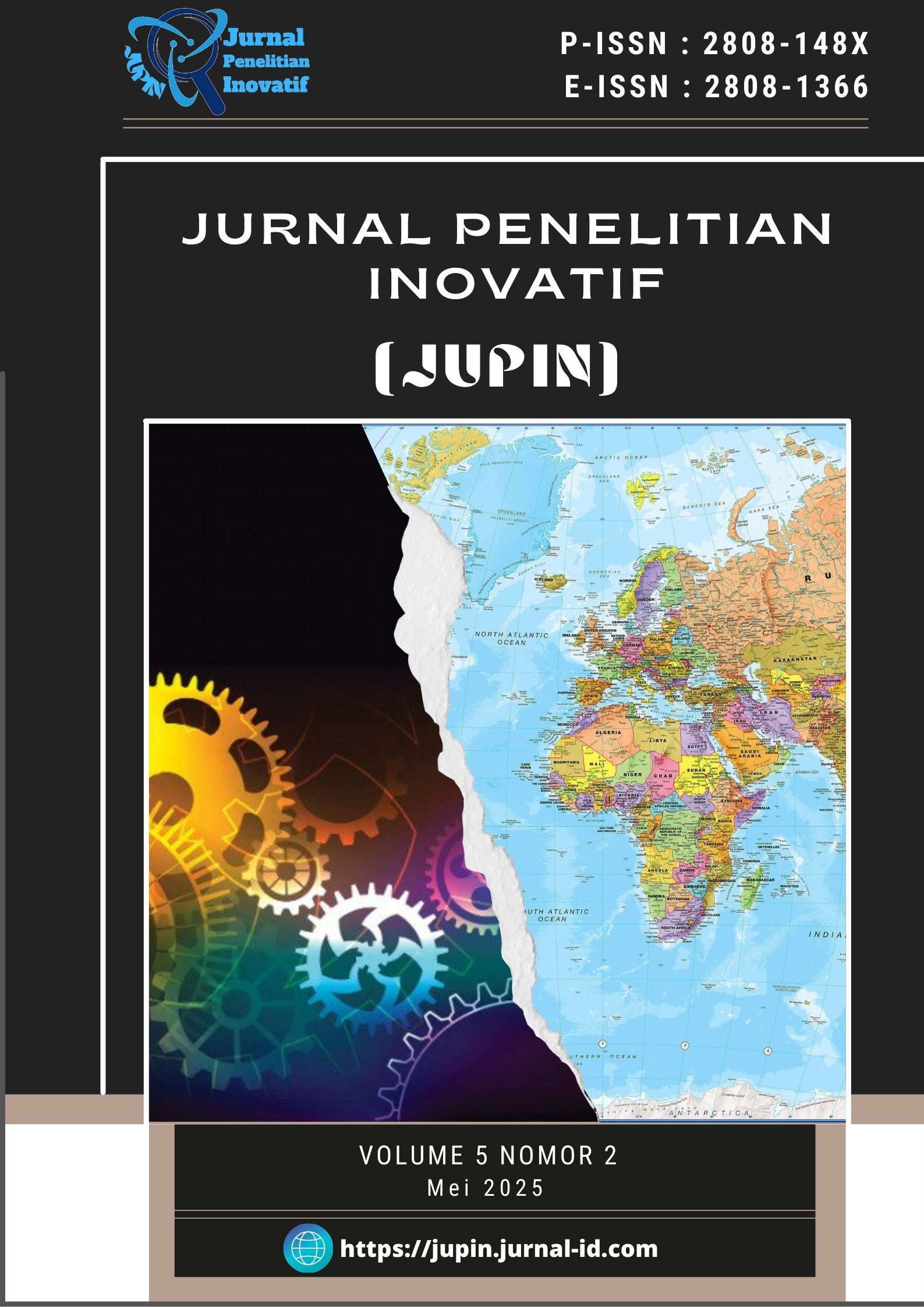Exploring The Relationship Between Language Skills and Academic Performance of Indonesian Students Abroad: A Multigroup SEM-PLS Approach
DOI:
https://doi.org/10.54082/jupin.1437Kata Kunci:
Academic Performance, Indonesian Students, Language Skills, Multigroup SEM-PLS, Study AbroadAbstrak
Language barriers remain a critical challenge for Indonesian students pursuing higher education abroad, potentially hindering their academic success. This study aims to analyze the effect of language skills on academic performance using Structural Equation Modeling–Partial Least Squares (SEM-PLS) with multigroup analysis. Data were collected through an online survey from 100 Indonesian STEM students studying in Asia and Europe, selected using probability sampling. The analysis confirmed a significant positive effect of language skills on academic performance (path coefficient = 0.464; p < 0.001). However, multigroup analysis showed no significant moderating effect of instruction language, study destination, or learning system (p > 0.05 for all groups). These findings highlight that language skills consistently influence academic outcomes across different contexts. The study provides empirical evidence to support the development of targeted language support programs and inclusive academic strategies for Indonesian students abroad.
Referensi
Aji, H. M., Berakon, I., & Md Husin, M. (2020). COVID-19 and e-wallet usage intention: A multigroup analysis between Indonesia and Malaysia. Cogent Business and Management, 7(1), 1–16. https://doi.org/10.1080/23311975.2020.1804181
Al-Krenawi, A., Khawaldeh, O. A., Al-Ja’afreh, S. A. H., Al-Natsheh, N. K., Abudoush, A. N., & Al-Habies, F. A. (2025). The Predictive Ability of Cultural Intelligence and Character Orientations for Psychological Adaptation in Expatriates. Journal of International Students, 15(3), 151–162. https://doi.org/10.32674/1tb65j82
Altay, M., Curle, S., Yuksel, D., & Soruç, A. (2022). Investigating academic achievement of English medium instruction courses in Turkey. Studies in Second Language Learning and Teaching, 12(1), 117–141. https://doi.org/10.14746/ssllt.2022.12.1.6
Anderson, J. C., Woods-Wells, T. M., Amal, T. M., Bass, R. T., & Simpson, C. Y. (2018). Examining the Relationships Among Motivational Factors and the Academic Achievement of Students Enrolled in a Comprehensive Agricultural Education Program. Journal of Career and Technical Education, 33(1), 27–48. https://doi.org/10.21061/jcte.v33i1.a2
Auschner, E., & Jiang, L. (2025). Implementing Chinese student support services at a German technical university. Journal of International Students, 15(5), 63–80. https://doi.org/10.32674/c7g6t059
Cabanillas, L. S. (2023). Exploring the Impact of Language Barrier on Academic Performance: A Case Study of Postgraduate International Students in the European Institute. In The London of Economics and Political Science.
Cheah, J. H., Amaro, S., & Roldán, J. L. (2023). Multigroup analysis of more than two groups in PLS-SEM: A review, illustration, and recommendations. Journal of Business Research, 156, 1–19. https://doi.org/10.1016/j.jbusres.2022.113539
Grain, H. M. J. S., Al-Gburi, G., Suleiman, O. W., Alghazali, T., Kadhim, A. J., Hassan, A. Y., & Dawood, I. I. (2022). Impact of English Language Proficiency, Multilingualism and Perceived Language Difficulties on International Student’s Academic Performance in Iraq. Eurasian Journal of Applied Linguistics, 8(2), 165–175. https://doi.org/10.32601/ejal.911550
Hair, J. F. ., Hult, G. T. M. ., Ringle, C. M. ., & Sarstedt, Marko. (2017). A primer on partial least squares structural equation modeling (PLS-SEM). SAGE.
Hair Jr., J. F., Hult, G. T. M., Ringle, C. M., Sarstedt, M., Danks, N. P., & Ray, S. (2021). Partial Least Squares Structural Equation Modeling (PLS-SEM) Using R. Springer. https://doi.org/https://doi.org/10.1007/978-3-030-80519-7
Martirosyan, N. M., Hwang, E., & Wanjohi, R. (2015). Impact of English Proficiency on Academic Performance of International Students. Journal of International Students, 5(1), 60–71. https://doi.org/https://doi.org/10.32674/jis.v5i1.443
Matiso, N. H. (2024). Optimising Culturally Responsive Pedagogies in Multicultural English Second Language Classrooms. International Journal of Learning, Teaching and Educational Research, 23(11), 384–401. https://doi.org/10.26803/ijlter.23.11.20
Pranita Devi, A. (2023). The Relationship between English Proficiency and Academic Achievement of Indonesian EFL Postgraduate Students. Journal of English Language Learning (JELL), 7(1), 303–308. https://doi.org/https://doi.org/10.31949/jell.v7i1.5566
RMRM, G., & S, S. (2022). The Impact of English Language Proficiency on Academic Performance with The Mediating Effect of Choice of Learning Approaches: The Case of A Management Faculty of A Sri Lankan University. Journal of Contemporary Perspectives in Accounting and Digitalization, 5(1), 50–69. https://doi.org/10.4038/jcpad.v5i1.3
Shi, X. (2023). English language proficiency, academic language difficulties and self-efficacy: A comparative study of international and home students in UK higher education. University of York Education.
Son, E., & Cvancara, K. (2024). Exploring Zoom Fatigue among International Students in U.S. Virtual Classes. Journal of International Students, 14(5), 2166–3750. https://doi.org/https://doi.org/10.32674/xdwnc294
Sun, H. L., Sun, T., Sha, F. Y., Gu, X. Y., Hou, X. R., Zhu, F. Y., & Fang, P. T. (2022). The Influence of Teacher–Student Interaction on the Effects of Online Learning: Based on a Serial Mediating Model. Frontiers in Psychology, 13, 1–10. https://doi.org/10.3389/fpsyg.2022.779217
Supriatna, E. (2023). Adaptation Strategies of Migrant Students in Adjusting to a New Campus Environment. AL-ISHLAH: Jurnal Pendidikan, 15(2), 2209–2217. https://doi.org/10.35445/alishlah.v15i2.3848
Waluyo, B., & Panmei, B. (2021). English Proficiency and Academic Achievement: Can Students’ Grades in English Courses Predict Their Academic Achievement? MEXTESOL Journal, 45(4), 1–10.
Yang, L., Wang, H., Zhang, H., & Long, H. (2024). The Relationships of Self-Sustained English Learning, Language Mindset, Intercultural Communicative Skills, and Positive L2 Self: A Structural Equation Modeling Mediation Analysis. Behavioral Sciences, 14(8), 1–18. https://doi.org/10.3390/bs14080659
Yassin, A. A., Razak, N. A., Qasem, Y. A. M., & Mohammed, M. A. S. (2020). Intercultural learning challenges affecting international students’ sustainable learning in Malaysian higher education institutions. Sustainability (Switzerland), 12(18), 1–19. https://doi.org/10.3390/su12187490
Ye, J., Lai, X., & Wong, G. K. W. (2022). A multigroup structural equation modeling analysis of students’ perception, motivation, and performance in computational thinking. Frontiers in Psychology, 13. https://doi.org/10.3389/fpsyg.2022.989066
Yuksel, D., Soruç, A., Horzum, B., & McKinley, J. (2023). Examining the role of english language proficiency, language learning anxiety, and self-regulation skills in emi students’ academic success. Studies in Second Language Learning and Teaching, 13(2), 399–426. https://doi.org/10.14746/ssllt.38280
Zainuddin, Z., Muftia Keumala, C., Tinggi Ilmu Ekonomi Lhokseumawe, S., Room, A., & Wah, M. (2018). Blended Learning Method Within Indonesian Higher Education Institutions. Jurnal Pendidikan Humaniora, 6(2), 69–77. http://journal.um.ac.id/index.php/jphpISSN:2338-8110/eISSN:2442-3890
Unduhan
Diterbitkan
Cara Mengutip
Terbitan
Bagian
Lisensi
Hak Cipta (c) 2025 Aisyah Juliawulan Malahayati, Yulia Sawitri, Hazful Maizi, Meutia Fadilla

Artikel ini berlisensi Creative Commons Attribution 4.0 International License.


















